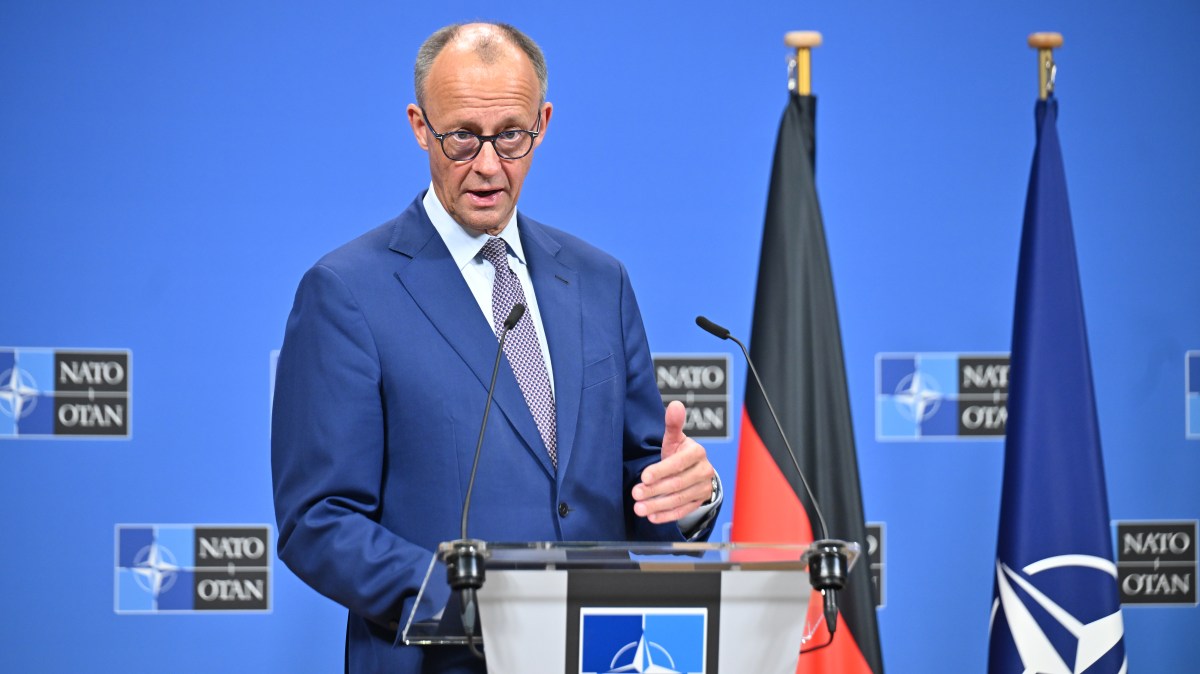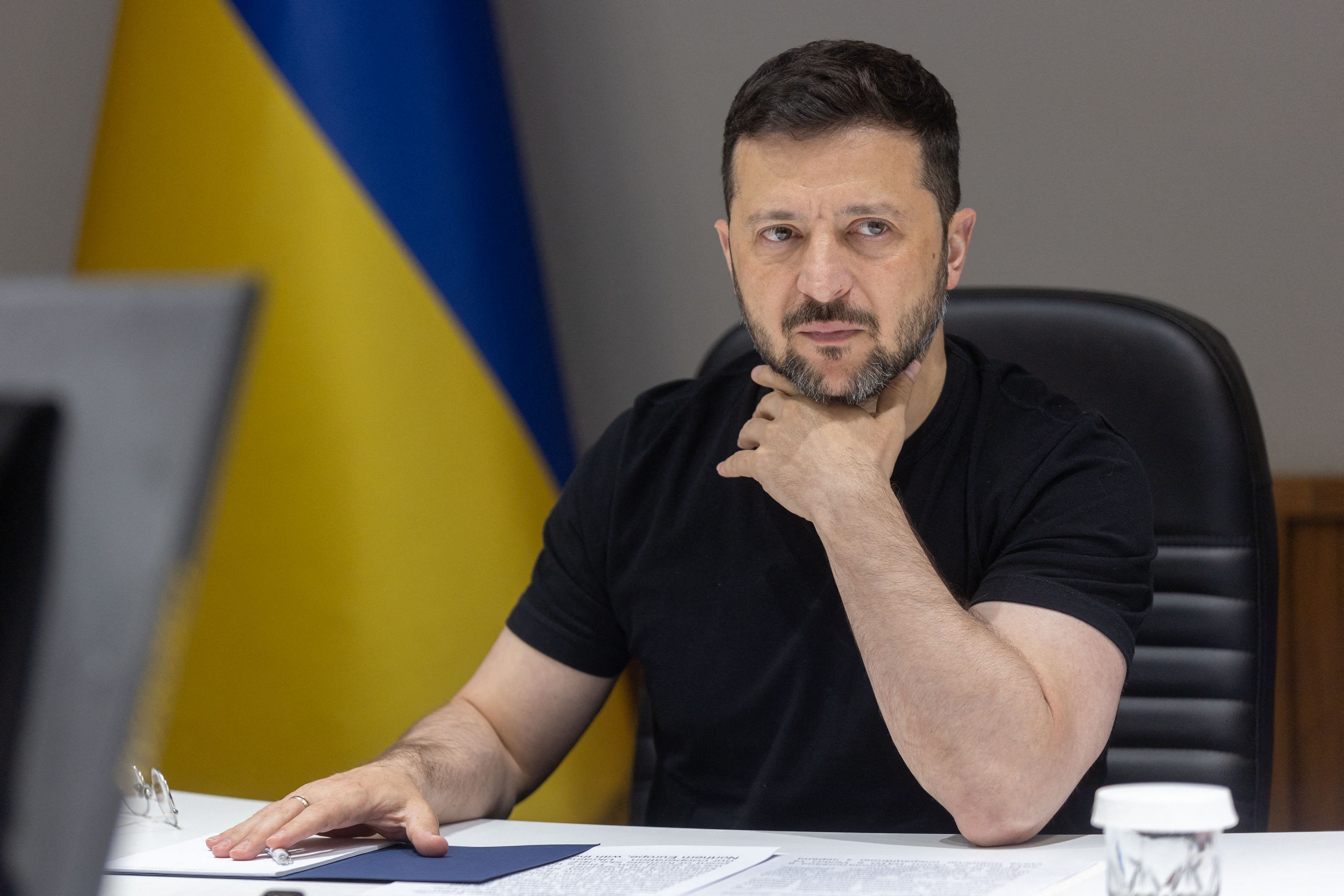Friedrich Merz, the chancellor of Germany, has said he has “high hopes that an agreement for a ceasefire in Ukraine will be reached this weekend”.
He said there was a “great chance’ that the three-day ceasefire that Russia declared from May 8 to May 10 could be extended to 30 days, Germany’s Bild newspaper reported on Friday. “Then negotiations on a peace treaty could also be started.”
Merz said that President Trump had informed him of a US plan for a 30-day unconditional ceasefire. Ukraine and its European allies were in favour, so the ball was “in Russia’s court”.
Merz was speaking before a meeting on Saturday of leaders of Europe’s “coalition of the willing,” the diplomatic effort launched by Sir Keir Starmer and President Macron of France to support Ukraine amid doubts over the Trump administration’s commitment to Kyiv’s war effort.
European leaders spoke to President Zelensky by video link at the Joint Expeditionary Force summit in Oslo
LISE ASERUD/EPA
Zelensky said in a video address to the Joint Expeditionary Force summit in Oslo on Friday that he would host Saturday’s meeting in Kyiv. He said there was “serious work ahead”, adding: “We need this coalition and we need it to be strong enough to guarantee security the way we all agree on.”
• Zelensky says Putin is ‘deceiving’ Trump with Victory Day ceasefire
Jonas Gahr Store, the prime minister of Norway, said there would be a meeting on Saturday involving his country, Ukraine and “the French and British leadership”. Neither Britain nor France has commented publicly on the meeting.
Merz said he had spoken to President Trump by phone on Thursday evening after meeting President Macron and Donald Tusk, the prime minister of Poland, on Wednesday. Merz was sworn in as Germany’s chancellor on Tuesday.
Zelensky will host leaders of the “coalition of the willing” in Kyiv k on Saturday
UKRAINIAN PRESIDENTIAL PRESS SERVICE/AFP/GETTY IMAGES
Merz told Bild that he had written a joint communiqué with Macron, Tusk and Starmer that was “largely identical” to the US proposal. “We very much hope that this will also be accepted on the Russian side,’ the chancellor said. “The ball is entirely in Moscow’s court.”
Russia unilaterally declared the three-day ceasefire to coincide with its Victory Day commemorations of the defeat of Nazi Germany, marked with a military parade in Moscow’s Red Square. Ukraine has accused the Kremlin’s forces of repeatedly breaking the supposed truce.
Despite Merz’s statements, one sceptical Ukrainian diplomat told Bild: “So far, we have not seen any willingness on Putin’s part to accept the 30-day ceasefire.” Putin had broken all agreements so far. “Why should this time be any different?” the diplomat said.
Giving a news conference in Brussels with Mark Rutte, the Nato secretary-general, Merz said that Trump had informed him of his plan for a 30-day unconditional ceasefire in Ukraine during their phone call.
A Ukrainian diplomat was sceptical that President Putin would keep to the ceasefire terms
ALEXANDER KAZAKOV/SPUTNIK/KREMLIN/EPA
“There is now a chance beyond this weekend to achieve a 30-day ceasefire in Ukraine. Ukraine is in favour of it and agrees to it, America has initiated and proposed it, and the major European states expressly agree to it,” Merz said.
“This really is another test case, a very precise and very accurate test case for the seriousness of the Russian president’s will to really achieve peace in Ukraine.
• ‘Don’t underestimate Putin — he can take out life as we know it’
“I am very grateful that we have such a great consensus on this, also and especially with the American president,” Merz added. “We will continue to support Ukraine, also following a peace agreement, Ukraine will need to be supported and strengthened.
“We will do this together and we will also continue to work as the German federal government to strengthen the European part within Nato. We have understood that we have to do more than we have done in the past, we will now increase our defence efforts quite independently of this war in Ukraine, we will increase our defence efforts in our own territorial interests.”
Russia launched a drone attack on Kyiv a day before Putin’s proposed ceasefire from May 8-10
PAVLO PETROV/STATE EMERGENCY SERVICE OF UKRAINE/AFP/GETTY IMAGES
Merz said that he had grown more optimistic about the future of Nato because he detected greater acceptance in the US administration of Europe’s role in the military alliance.
“I am pleased to note that the American government’s attitude has evidently changed, including its acceptance of what we are doing as European Nato partners. They recognise that we are expanding our efforts considerably.”
He said he therefore had hopes that it would be possible to develop a joint strategy with the Americans at the Nato summit in June.
“America is indispensable for Europe’s security today and for a long time to come, ” Merz said, adding that he was more optimistic now about Nato’s future than he had been on the night of his election victory in February, just after the Munich Security Conference at which differences with the US administration had come to the fore.




